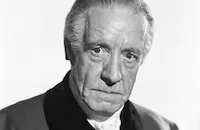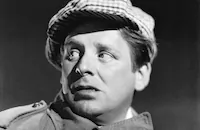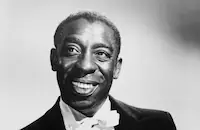The Wet Parade

Brief Synopsis
Cast & Crew
Victor Fleming
Dorothy Jordan
Lewis Stone
Neil Hamilton
Emma Dunn
Frederick Burton
Film Details
Technical Specs

Synopsis
In the South, in 1916, the wealthy Chilcote family begins to falter as the father, Roger, suffers from years of heavy drinking. His daughter Maggie May, who loves him very much, wants to help him stop drinking, but he doesn't believe he can. After a month of abstinence, Chilcote yields to temptation and starts a lenghty binge, during which he gambles away everything the family has. Overcome by remorse and a victim of delirium tremens, Chilcote finally commits suicide. After his funeral, Maggie May hysterically tells his father's old drinking cronies that she hopes that every drop of liquor will be destroyed. At the same time, Roger, Jr. a writer, contacts his friend, newspaperman Jerry Tyler, to say that he is moving North to turn his first novel into a play. The hotel where Jerry lives is run by hard-working Mrs. Tarleton, whose husband Pow is also a drunkard, but whose devoted son Kip is a teetotaler. In the election of 1916, Mr. Tarleton campaigns for Woodrow Wilson, while his wife and son hope that Charles Evens Hughes will win and bring in Prohibition. On election night, Roger arrives at the hotel and gives Pow a drink, but Kip refuses. Despite the closeness of the election, Wilson eventually wins, leading to a victory binge for Jerry, Pow and Roger. When the United State enters the war, Jerry goes to France, while Kip stays home to help his mother, and Roger, who is 4-F, is happy to stay home because he thinks all wars are insane. When the Food Control Act goes before Congress, it passes because people think that the grain used for liquor will now make bread for the soldiers. When the Volsted Act outlawing liquor is passed, Wilson refuses to sign it, but it is eventually ratified as the Eighteenth Amendment, much to the consternation of returning soliders. When Maggie May goes to visit Roger after the war, Kip at first thinks she is a prostitute and tries to throw her out, then is embarassed to find out who she really is. Despite their difference social backgrounds, the two soon fall in love. On the eve of Prohibition, all of New York goes on a spree of drinking and stocking up on liquor. Despite the hopes of temperance people, liquor is widely available during Prohibition. One day, desperate for a drink, Pow gets bootleg liquor from a paint store, goes crazy from the bad alcohol, then beats his wife to death when she breaks his jug. After being convicted of murder, Pow is sentenced to life in prison, over the pleas of his lawyer who blames the bad alcohol. Kip also realizes that his father was a victim of the poisoned alcohol and forgives him, telling the broken Pow that his wife would forgive him too. A short time later, Kip has to close the hotel and sadly says goodby to his longtime residents. Maggie May, who has comforted Kip throughout his ordeal, tells him she loves him and promises to help him fight the bootleggers and others who have caused such destruction with liquor. Kip then joins the Treasury Department and becomes the partner of veteran Abe Schilling. Kip does well in his job and refuses bribes from bootleggers, despite their threats. Soon Maggie May becomes pregnant, delighting her, Kip and Abe, but not Roger, who thinks they are all crazy. As bootleggers become more organized, Kip and Ape raid a club run by Roger's girlfriend, Eileen Pinchon. Later that night, Roger gets some bad bootleg whiskey made from wood alcohol and the next morning goes blind. Eileen leaves him, but Kip and Maggie May stand by him. On the night that Maggie May gives birth, the bootleggers threaten Kip again, but he refuses to listen to them. At the hospital, he is tricked into going outside, and is kidnapped by the bootleggers. Abe sees them and follows, and with the aid of a policeman and a cab driver, rescues Kip, but is mortally wounded himself. Before he dies, Abe tells Kip to leave the treasury to take care of Maggie May and the baby.

Director

Victor Fleming
Cast

Dorothy Jordan

Lewis Stone

Neil Hamilton
Emma Dunn
Frederick Burton
Richard Barlow
John Larkin
Gertrude Randolph

Robert Young

Walter Huston

Jimmy Durante

Wallace Ford

Myrna Loy

Joan Marsh

John Miljan

Clarence Muse
Clara Blandick
John Beck

Eily Malyon
Harry Holman
Clarence Hummel Wilson

Cecil Cunningham
Crew
Adrian
Dr. William Axt
Anne Bauchens
Gavin Burns
Tom Dowling
Edward Fitzgerald
Victor Fleming
Cedric Gibbons
John L. Mahin
James Manatt
Oscar Radin
Douglas Shearer
Cullen Tate

Videos
Movie Clip



Film Details
Technical Specs

Articles
The Wet Parade (1932) -

The Wet Parade (1932) -
Quotes
Trivia
Notes
According to news items in Film Daily and Hollywood Reporter, Virginia Bruce, Max Davidson, Frank McGlynn, Rolfe Sedan and Jack Jordan were also in the cast, however, Bruce and Sedan were not in the viewed print and it has not been determined if they or the other actors mentioned appeared in the completed film. The Volstead Act, which became the Eighteenth Amendment to the Constitution, was passed into law over President Woodrow Wilson's veto on October 18, 1919. It was repealed by the Twenty-First Amendment on December 5, 1933. According to modern sources, M-G-M paid Upton Sinclair $18,000 for the rights to his novel.














